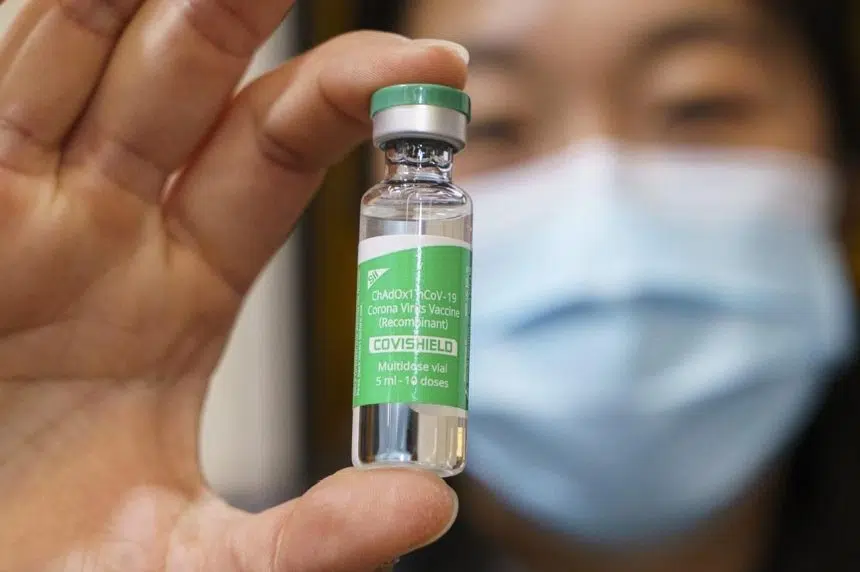The province is putting a bit more behind a plan to give the Pfizer COVID-19 vaccine as a second dose to people who got AstraZeneca as their first.
If there are AstraZeneca doses available, they’ll be offered, but Premier Scott Moe said there’s no word on any allocation right now.
Scott Livingstone, the CEO of the Saskatchewan Health Authority (SHA), said there was a high uptake of AstraZeneca in March — with more than 65,000 people getting the vaccine — and that was good because it saved lives and prevented infection.
“We’re just not sure about allocations in the future,” said Livingstone.
Data coming out of studies in the U.K. is suggesting that Pfizer as a second dose is just as effective as two doses of AstraZeneca, explained Dr. Saqib Shahab, the province’s chief medical health officer.
“That is very reassuring and that will likely be what will be offered in Saskatchewan as a second dose,” said Shahab.
Shahab said over the next two weeks, health officials will get more information to confirm this and the province’s plans will be finalized.
Second doses are expected to start on Monday, but the province didn’t start getting AstraZeneca until mid-March so there are still a few weeks before those recipients will become eligible.
Shahab said Pfizer and Moderna will be the bulk of the second doses given in Saskatchewan.
Some provinces have stopped using AstraZeneca as a first dose because of the unsure supply. It’s also not being used for first doses in Saskatchewan anymore, but Livingstone said it’s because there aren’t many doses left in the province. He said that didn’t mean the province wouldn’t use it for first doses again.
Touting the reopening plan
On Tuesday morning, Prime Minister Justin Trudeau said the country could have a better “one-dose” summer if a large number of people get vaccinated, but he warned that restrictions should stay in place until restrictions go way down.
A few hours later, Moe said Saskatchewan won’t have a one-dose summer.
“We’re going to have a one-dose spring (and) quite likely a two-dose summer as we are planning to have second doses available to everyone in the province by sometime in the middle of July,” said Moe.
Moe said he’s feeling strongly about the vaccination uptake in Saskatchewan and the province’s Re-Opening Roadmap was based on that.
Moe said the first step of the plan isn’t broad and by the time the second step comes around, Saskatchewan will likely be near or above the 75 per cent first dose and 20 per cent second dose recommendation that has come from the federal government.
Moe said there’s something important for us and the prime minister to recognize.
“We’re not just going to turn a switch and the economy comes on when we hit 75 per cent or some magic number,” Moe said. “We need to gradually reopen the economy, gradually bring people back into their communities, allow people time to reintegrate back into what life used to be like.”
The premier was adamant that the province will reopen.
“We are going to go back to a normal society here. That is why we are asking, encouraging (and) making it as accessible and as convenient as possible for everyone to get vaccinated,” said Moe.
Moe admitted there will be a small number of people who will chose not to get a shot. He said those people will have to understand that they won’t be protected.
“If you choose not to be vaccinated when we have provided access and the opportunity to be vaccinated from corner to corner in this province, there is a certain degree of risk that you are choosing to live with and we will not keep society in Saskatchewan locked down when you have made a conscious choice to not take a vaccine that is offered to you,” said Moe.
COVID shots are working
While more than half of Saskatchewan residents still have yet to get their first COVID shot, for those who got their first dose, they’re working.
Shahab said the numbers show the shots are just over 99 per cent effective.
Looking at cases which came up three weeks or more after a person got their first shot, Shahab said 263 people developed a COVID infection out of 309,276 people who were vaccinated. The vaccinations had been done to April 17 and the analysis of infections was done up to May 8.
Shahab said that means the cases, called breakthrough cases, were at 0.09 per cent.
“This is quite remarkable actually, that with just one dose the vaccine is protecting us so well, and that reinforced the fact that all of us need to get vaccinated, and of course, follow up with the second dose as well,” said Shahab.











